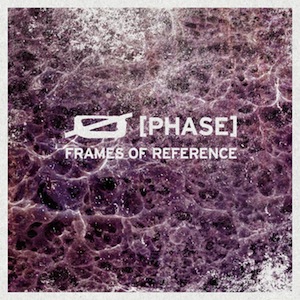Ø [Phase] Frames of Reference
Listening to an album like Ø [Phase]‘s full-length debut, Frames of Reference, feels like waiting […]

Listening to an album like Ø [Phase]‘s full-length debut, Frames of Reference, feels like waiting for the hammer to fall. It doesn’t explode, instead favoring a slow, twisting burn, and it’s worth our time to the same degree that it’s out of step with techno’s current trend toward harder, scuffed sounds. But at its core, this is still pure, tightly wound techno, even if it lacks the claustrophobic vibe that often gives music in the category its tension and drama. Ashley Burchett has been active since 2000 and, like we’ve seen with recent full-length efforts from Drumcell and Function, he’s given himself a long lead time for this LP. However, as compared to those other 2013 debuts, Frames of Reference could more easily appeal to non-techno heads. Applying lessons learned from Robert Hood—whose influence has been an incredibly fertile force as of late—Burchett straddles all the classic polarities between humans and machines, melody and abstraction, forward movement and peaceful stasis. Frames of Reference is in an intense dialogue with techno’s philosophy, but the results are hardly exclusive.
These 10 tracks seem to roll off the assembly line, but are too silken for a word like “industrial” to apply, and the album’s melodies are too well-managed to really veer into spiral-trance mode. Yet the experience is not unlike Petar Dundov’s Sailing off the Grid, reeling off one microcosm after another with a sublime sense of pace. It reaches for a listening pleasure that doesn’t belong to techno alone. This approach is particularly apparent in the strategic way that the album keeps the bass at a low boil while letting the mids and treble play across the stereo field, like on the cinematic, dubby “Perplexed,” which contains shades of Redshape. Where a group like AnD summons a compressed, fight-or-flight response, Ø [Phase] plays a subtler but no less engaging game, teasing out different gradients of sickness over extended periods.
Most unexpectedly, the kick drums are demoted to a kind of heartbeat role, even when we expect them to be the main protagonist. It’s kind of like hearing a DJ set from the floor below Berghain, the dopesick churn of a nearby bacchanal, on top of which Ø [Phase] creates a conversation between Tourette-stricken machines. Techno has more than a little in common with literary modernism’s pages-long sentences, and it’s a comparison that seems apt considering the way Frames of Reference summons themes by sloshing its vocabulary around. This album’s hazy float also aligns well with the resurgence of dub-techno influences, its twisting wreaths of ping-pong delay contrasting with steam-scorched distortion and hardcore psychosis. Ø [Phase] comes across as being primarily concerned with pursuing techno’s function as a form of deep body meditation. Frames of Reference just happens to stick out as an alternate route to the heart of machine music’s appeal.

